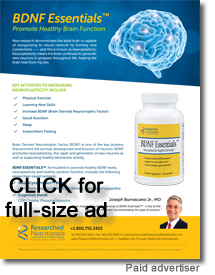|
Page 1, 2
Does Bisphenol A Cause Attention Deficit-Hyperactivity Disorder?
Data from the 2007 and 2011/12 National Survey of Children's Health in the United States were used to examine the association between formula feeding and a preschool diagnosis of attention deficit-hyperactivity disorder (ADHD). In the 2007 cross-sectional study of 11,198 children, the prevalence of ADHD was more than five times higher in those who had been formula-fed than in those who had been breastfed (adjusted odds ratio = 5.58; 95% confidence interval [CI], 2.16-14.41). In the 2011/12 cross-sectional study of 12,498 children, there was no significant association between formula feeding and later ADHD (adjusted odds ratio = 1.05; 95% CI, 0.42-2.64).
Comment: Bisphenol A (BPA; a compound with known neurotoxic effects in experimental animals) was widely used in the production of baby bottles and formula cans until around 2008. At that time, many manufacturers stopped using BPA in the production of these products, and many retailers began refusing to sell products that contained BPA. In previous observational studies, breastfeeding during infancy was associated with a lower risk of subsequent ADHD. Although this association was thought to be due at least in part to the nutritional advantages of breast milk, a possible adverse effect of BPA in formula-fed children could not be ruled out. In the present study, formula feeding was associated with an increased risk of subsequent ADHD during the years that BPA was being used, but not after BPA was removed from baby products. That finding suggests that early exposure to BPA may promote the development of ADHD.
Adesman A, et al. Formula feeding as a risk factor for attention-deficit/hyperactivity disorder: is bisphenol A exposure a smoking gun? J Dev Behav Pediatr. 2017;38:545-551.

 Gluten and Psoriasis Gluten and Psoriasis
Of 97 Russian patients with psoriasis, 13 (14%) had elevated levels of antigliadin IgA antibodies. In contrast, only 2% of 91 controls had elevated antibodies. All 13 patients with increased antigliadin IgA antibody levels were advised to follow a strict gluten-free diet without any other modifications in their treatment. At 12 months, all patients were improved. The mean degree of improvement was 36% in the patients who had elevated but not greatly elevated antigliadin IgA antibody levels, and the mean degree of improvement was 56% in the five patients who had greatly elevated antibody levels.
Comment: In this study, consumption of a gluten-free diet improved psoriasis in patients who had elevated levels of antigliadin IgA antibodies. The study did not investigate whether patients without increased antigliadin antibody levels would also improve on a gluten-free diet. However, a previous study found that a gluten-free diet improved psoriasis only in patients who had increased levels of IgA and/or IgG antigliadin antibodies.7
Kolchak NA, et al. Prevalence of antigliadin IgA antibodies in psoriasis vulgaris and response of seropositive patients to a gluten-free diet. J Multidiscip Healthc. 2018;11:13-19.

References
1. Cameron E, Pauling L. Supplemental ascorbate in the supportive treatment of cancer: reevaluation of prolongation of survival times in terminal human cancer. Proc Natl Acad Sci. 1978;75:4538-4542.
2. Creagan ET, et al. Failure of high-dose vitamin C (ascorbic acid) therapy to benefit patients with advanced cancer. N Engl J Med. 1979;301:687-690.
3. Moertel CG, et al. High-dose vitamin C versus placebo in the treatment of patients with advanced cancer who have had no prior chemotherapy. A randomized double-blind comparison. N Engl J Med. 1985;312:137-141.
4. Gaby AR. Cancer. In Nutritional Medicine, Second Edition. 2017, Concord, NH, www.doctorgaby.com, chapter 325.
5. Miller JW, Ulrich CM. Folic acid and cancer - where are we today? Lancet. 2013;381:974-976.
6. Sabour-Pickett S, et al. Supplementation with three different macular carotenoid formulations in patients with early age-related macular degeneration. Retina. 2014;34:1757-1766.
7. Michaelsson G, et al. Psoriasis patients with antibodies to gliadin can be improved by a gluten-free diet. Br J Dermatol. 2000;142:44-51.
Alan R. Gaby, MD
drgaby@earthlink.net
Page 1, 2
|
![]()
![]()
![]()
![]()






